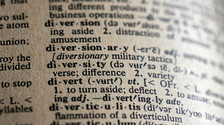Having grazed here on the fields of italki for a while, I have noticed that one of the big difficulties for non-natives who practice Russian is not the orthography (for there are plenty of spell checking sites) or noun cases and inclinations of adjectives and verbs (the tables with all that stuff are also not uncommon), despite these matters being worthy of attention.
The big problem is in understanding aspects of Russian verbs.
The Russian verb aspects is a grammatical category that describes how the action unfolds across time. The meaning of this terse explanation is probably hard to understand, so let us refer to the short list with the names of possible aspects and look how they can diversify our speech.
This list may not be complete and you may extend it up to your desire and fantasy. And not all items on it may be found in each particular language. Browsing the Internet, I have seen a sort of linguistic sand-box, made by enthusiasts experimenting with their own artificially compiled languages.
So, here it is what we may generally have:
|
Aspect |
Function (the purpose and what for it is used) |
|
Stative |
Default aspect. General truths, aphorisms or stating inherent properties. “Fish swim”, “gems shine”, “I know French” |
|
Perfective |
Actions which are complete |
|
Progressive |
Actions in progress |
|
Habitual |
Actions occurring habitually or repeatedly |
|
Imminent |
Actions about to occur |
|
Precessive |
Actions that just occurred |
|
Inceptive |
Beginning of an action |
|
Terminative |
Ending of an action with implied completeness |
|
Pausal |
Temporary cessation of an action with an implied intention to resume |
|
Resumptive |
Resumption of an action |
The aspects in English and in Russian
In English we can see four aspects: simple, perfect, progressive and perfect progressive.
The reason English speakers have difficulty when they learn Russian is that in Russian the aspects are a bit different.
Actually, there are two differences - perfective and imperfective (глаголы совершенного и несовершенного видов).
Perfective
The verbs of the perfective aspect indicate the completeness of an action. In using them, we imply the result of an action, its entirety; or the accomplished beginning.
Speaking about timing categories, the perfective has no present form. The perfective has only past and future.
Indefinite
In the indefinite form, you may identify it by the indefinite question:
- что сделать? What is to be done?
Examples:
- добежать - To run down to the finish.
- купить - To buy (with an expected evident finished result).
- зазвенеть - To ring (with definite start of the action).
- построить - To build (with the view of being finished).
- запеть - To sing (with the idea of the expected or happened start).
In the past tense, the questions to check for are:
- что сделали? что сделала? что сделал? что сделало? What they (she, he, it) have (has) done?
Examples:
- подбежали - They have run up to...
- увидела - She has seen...
- нашел - He has found...
- взошло (солнце) - It has risen (the sun).
In the future tense, the questions to check for are:
- что сделают? что сделаю? что сделает? What they (I, he/she) will have done?
Examples:
- выйдут - They’ll have gone out...
- куплю - I’ll have bought...
- доплывет - He’ll have swam up (to expected something).
- посчитаем - We’ll have count up...
Imperfective
The verbs of imperfective aspect imply the duration, continuation, or repetition of the action while not putting emphasis on their completeness.
The verbs of imperfect aspect have all three timing forms: past, present, and future. But in Russian, as it may be seen from the definition, the imperfective has no difference in meaning between simple, past and past continuous.
In the indefinite form, you may identify it by the indefinite question:
- что делать? What to do?
Examples:
- петь - To sing.
- кипеть - To seethe.
- бежать - To run.
- мечтать - To dream.
- перечитывать - To reread.
- подпрыгивать - To bounce.
In the past tense, the questions to check for are:
- что делали? что делал? что делала? что делало? What they (he, she, it) were doing or what they (he, she, it) did?
Examples:
- бежали – They were running or they ran.
- прыгал – He was skipping or she/he skipped.
- искала – She was searching or she searched.
- заходило – It was setting or it set (the sun, the moon).
In the present tense, the questions to check for are:
- что делают? что делаем? что делает? What are they (we, she/he) doing or what do (does) they (we, she/he) do?
Examples:
- загорают – They are taking a sunbath or they take a sunbath.
- строим – We are building or we build.
- подтягивается – He is pulling himself up or he pulls himself up.
- покупаю – I am buying or I buy.
In the future complex (it is made of the future form of the verb быть + infinitive):
что будут делать? что буду делать? what they (I) will be doing or what they (I) will do?
Examples:
- будут прыгать – They will be jumping or they will jump.
- буду смеяться – I will be laughing or I’ll laugh
- будем слушать – We will be listening or we’ll listen.
- будет танцевать – She will be dancing or she’ll dance.
Here are the examples of some verbs in indefinite form:
|
Perfective |
Imperfective |
Meaning |
|
положить найти поймать взять |
класть искать ловить брать |
to put to search to catch to take |
Sentences with these verbs:
|
Perfective |
Imperfective |
|
Я хочу положить книгу на полку. Я пытался найти потерянные ключи. Эту бабочку трудно поймать. |
Не надо ничего сюда класть. Тут бесполезно что-либо искать. Но ее очень интересно ловить. |
There’s one more aspect of the imperfective to be known and understood. Which is the imperfective subdivides into the indeterminate and determinate.
Examples
The verbs носить and ходить (to carry, to go) are indeterminates:
- я ношу, ты носишь, он-она-оно носит, мы носим, вы носите, они носят;
- я хожу, ты ходишь, он-она-оно ходит, мы ходим, вы ходите, они ходят.
But the verbs нести and идти (to carry, to go) are determinates:
- я несу, ты несешь, он-она-оно несет, мы несем, вы несете, они несут.
- я иду, ты идешь, он-она-оно идет, мы идем, вы идете, они идут.
So then what is the difference? Let us take two examples:
1. Соседка всегда носит мне хлеб, когда ходит в супермаркет - both verbs are of the indeterminate aspect
- Once the Соседка started to go to супермаркет, and each time she does it, she brings me the хлеб. The ritual had once started and has not finished. It is indefinite and still goes on.
2. Соседка всегда несёт мне хлеб, когда идет в супермаркет - both verbs are of the determinate aspect.
The situation is clear and strictly fixed. Each time the Соседка goes to супермаркет, she brings me хлеб. This is the fixed rule.
Having read a ton of information about aspects of Russian verbs, it will take some time for you to absorb and put into practice all this information. Thankfully, I have prepared exercises for you to apply what you have learned.
And here is your homework for better understanding the matter (I deliberately omitted the translation):
A. Please choose the imperfect verbs from the following sentences:
- Кругом все белело от снега. Мокрая земля подмёрзла и выдерживала тяжесть человека.
- Ударившись о землю, воздушный шар подскочил кверху, описал в воздухе огромную дугу и снова опустился вниз.
- Тонкий туман стоит вдали над жёлтыми полями.
B. Please choose the verbs of the perfective aspect from these verbs:
- Посмотреть
- Шагать
- Бросить
- Уйти
- замереть
C. Please choose verbs of the perfective aspect from these verbs:
- Зазвенеть
- Отгреметь
- Запеть
- Решал
- Исчез
- Исчезну
- исчезаю
D. Please choose from these verbs the verbs of the imperfective aspect:
- Приношу
- Принёс
- Мерю
- Мерить
- Мерил
- Взглянуть
- Привлечь
- Цвести
- Спрашивать
- бегаю
E. Please choose the verbs of the perfective aspect from these verbs:
- Потом сосны сменились березами, и за ними блеснула вода.
- На дне лежало несколько темных больших стволов.
- Ни одна елка не склонится ни под какой тяжестью, а береза чуть что и склоняется.
- Это нынче на рассвете наша вишня расцвела.
- Мы бежали к старой скирде камыша, что стояла на берегу.
- Вода в пруду почернела, и легкая лодочка уже скользила по ней.
F. Please choose the pairs where both verbs are of the imperfective aspect from the pairs beneath:
- cогнуть – сгибать, послать – посылать
- бежать – бегать, открыть – приоткрыть
- пахать –вспахать, нести – носить
- макнуть – обмакнуть, цвести – отцвести
- лететь – летать
G. Please choose the verbs of the perfective aspect from these sentences:
- Как только привыкнем к чему-нибудь, так и разучимся замечать.
- Падали листья, но они были не золотые, а сероватые, с лиловыми прожилками.
- Лес утонул в дремучих сугробах.
- На берегу недвижно замерли кусты лозняка.
- Ревел гром, блистали молнии, шуршала трава.
- На вершинах берез кричат сонные грачи.
- Стволы дубов оттаяли, почернели.
- Сияет солнце, воды блещут, во всем улыбка, жизнь во всем.
- Взрослые грачи целый день летали за кормом на поля, где тракторы перепахали землю.
I hope you do not feel crazy about practicing all of this. Which structures is better used is dependent on your mood and sense of the situation.
Finally, I would like to give you here a list of Russian verbs of motion, sorted by their aspects:
|
Imperfective |
Perfective |
Meaning |
|
|
Indeterminate |
Determinate |
||
|
ходи́ть |
идти́ |
пойти |
to go by foot (walk) |
|
е́здить |
е́хать |
поехать |
to go by transport (drive, train, bus, etc.) |
|
бе́гать |
бежа́ть |
побежать |
to run |
|
броди́ть |
брести́ |
побрести |
to stroll, to wander |
|
гоня́ть |
гнать |
погнать |
to chase, to drive (cattle, etc.) |
|
ла́зить |
лезть |
полезть |
to climb |
|
лета́ть |
лете́ть |
полететь |
to fly |
|
пла́вать |
плыть |
поплыть |
to swim, to sail |
|
по́лзать |
ползти́ |
поползти |
to crawl |
|
вози́ть |
везти́ |
повезти |
to carry (by vehicle) |
|
носи́ть |
нести́ |
понести |
to carry, to wear |
|
води́ть |
вести́ |
повести |
to lead, to accompany, to drive (a car) |
|
таска́ть |
тащи́ть |
потащить |
to drag, to pull |
|
ката́ть |
кати́ть |
покатить |
to roll |
Answers:
A. 1 – белело, выдерживала 2 – none 3 – стоит
B. – посмотреть, бросить, уйти, замереть
C. – зазвенеть, отгреметь, запеть, исчез, исчезну
D. – приношу, мерю, мерить, мерил, цвести, спрашивать, бегаю
E. 1 – сменились, блеснула 2 – none 3 – не склонится
E. 4 – расцвела 5 – none 6 – скользила
F. бежать – бегать, нести – носить, лететь – летать
G. 1 – привыкнем, разучимся 2 – none 3 – утонул 4 – замерли
G. 5 – none 6 – none 7 – оттаяли, почернели 8 – none
G. 9 – перепахали







